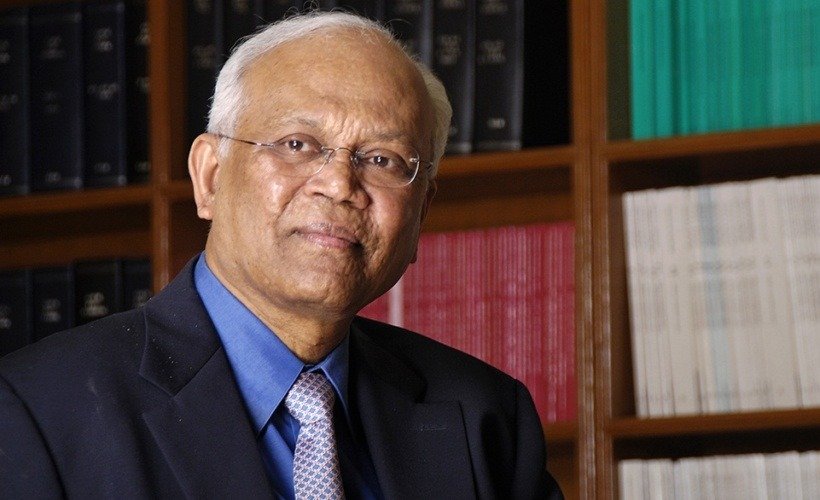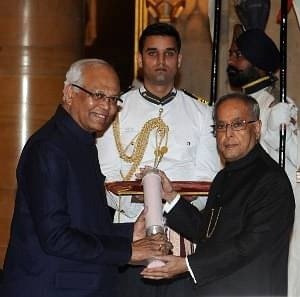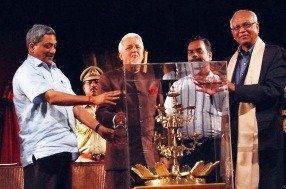
Critical thinker and scientist Dr. RAGHUNATH A. MASHELKAR proposes a 5-point strategy to overcome the technology deficit in the country
Raghunath A Mashelkar, former Director General of the Council of Scientific and Industrial Research (CSIR) is of the opinion that India needs to reinvent the ‘Make in India’ programme. “We do not need just assembled in India but need invented in India, designed in India and then manufactured in India failing which, we will continue to remain vulnerable,” Mashelkar told India’s management leaders through an online dialogue organized recently by All India Management Association (AIMA). He also spoke of how our nation can become ‘atmanirbhar’ (self-reliant) only with the right amount of ‘atmavishwas’ (self confidence) in ourselves.
Shedding light on the business scenario in India, Mashelkar pointed out how trading in India was easier than to make in India, owing to extreme bureaucracy and that businesses of varying sizes had to comply with thousands of compliances on a daily basis. He also spoke of the many impediments in the path of ‘Make in India’ which the Prime Minister himself has acknowledged such as land, labour, law, logistics, among others.
The senior scientist cited the example of mobile phone assembly in India in which the Chinese had a 9% share about five years ago and today, they command a 68% share in the same. He also pointed out as to how the share of Indian companies in the sector has dwindled from 45% to a meager 7% over the last five years. Questioning these statistics as to why India’s share has reduced drastically on its own land while the Chinese have made progress in our country, Mashelkar said, “India stuck to trading while the Chinese went on to innovate, create customisations and focussed on novel customer needs!”
Mashelkar further pointed out to the case of pharmaceutical APIs wherein India used to be self sufficient but quit production due to imports from China becoming cheaper and easier. The processes followed by the Chinese were not eco-friendly with their costing being opaque, he said. However, he expressed his happiness over how the Government of India is taking steps to change its policy in the right direction.
The online session was moderated by Sanjay Kirloskar, President AIMA and Chairman and Managing Director, Kirloskar Brothers Ltd; and anchored by Rekha Sethi, Director General AIMA.
Offering his comments during the session, Kirloskar pointed out that during COVID-19 pandemic, most nations decided to opt for self-sufficiency following the breakdown in global supply chains and trust among nations. He further said that India’s own attitude had toughened mainly against imports from China after the border violence episode and the banning of Chinese apps was pin-pointing towards India’s self-confidence in replacing them with locally developed apps.
In this regard, Mashelkar proposed a five-point strategy in order to make India more self-reliant and self sufficient. He enlisted:
- Buy
- Make
- Buy to make better
- Make to buy better and
- Making together
These are ways to overcome the technology related shortfall that India is experiencing.

He made a mention of the Prime Minister’s five pillars in order to achieve an ‘atmanirbhar’ Bharat which are economy, infrastructure, systems, demography and demand; and further said that these five pillars along with the five pillars that he has suggested for innovation and technology need to supplement each other to make India a superpower by itself.
Mashelkar cited the instance of Sony’s purchase of transistor patents from the United States of America to make better products than the Americans to illustrate how buying technology can help. To materialize the idea of ‘buy to make better’, India needed critical components from China in various sectors such as pharmaceuticals, automobiles, electronics and capital goods. Mashelkar specified how India’s strategy has to be ‘less China’ and not ‘no China’. He mentioned how India is heavily dependent on China not just for technology but also for components required in order to create that technology! Mashelkar spoke of how we need to have ‘strategic patience’, a term coined by Dr. Vijay Kelkar, wherein he explained the manner in which we need to have a grand strategy ready at our disposal before we take the decision to entirely boycott China and Chinese goods.
He further illustrated the ‘making to buy better’ point by citing the example of India making the ‘Param 10000’ super-computer entirely on its own to put across to America that denying technology to India would result in India becoming its prime competitor.
He then spoke of how ‘making it together’ was the critical aspect for development of novel technology and applications in the country. He spoke of the creation of a public-private partnership namely the ‘New Millennium Indian Technology Leadership Initiative’, while stressing upon the word ‘leadership’ as the need of the hour is to become leaders and not remain followers. He argued that the Government of India needs to take fiscal risks and the private partner must pay back only if the project succeeds. He said that the Government also has to take the risk in procurement in order to promote startups which face ban or barring characteristically because of tender-related circumstances.
Highlighting factors which are necessary to make India self-reliant, Mashelkar spoke of how allowing overseas competitors in is a vital factor for achieving the dream of an ‘atmanirbhar’ Bharat. “India needs to develop global standards and not local ones, because Indian companies will continue to remain small and confined to India. We cannot go back to the License Raj,” he emphasised.
Mashelkar expressed disappointment over how India had the required talent and technology but lacked trust. According to him, India’s biggest challenge remains its deficiency on the trust front rather than the budget front. At this juncture, he cited the example of Simputer, which was made just for India and was way ahead of Apple’s iPhone and Samsung’s Galaxy mobile phones; however, it failed to get acceptance only because the trust factor was missing. He also gave an example of a Dengue test developed by an Indian company which found no takers till the epidemic hit at which time; the developer did not have sufficient stock of the test kits.
Nonetheless, he pointed out that during COVID times, Indian startups, IITs and CSIR have been quick to develop the COVID testing kits and ventilators, largely because of lack of availability of imports. Mashelkar elaborated further, saying that India and Indians, especially the new generation was thinking beyond limits of self-reliance and has the requisite self-confidence to make Indian companies shine on the global map. He asserted how the Indian youth do not want to follow footsteps of the likes of Satya Nadela and Sundar Pichai and go overseas to find jobs and rise to CEO positions. He said that they aspire to build Microsofts and Googles right here in India itself.
This online session with Mashelkar witnessed an audience of more than 800 people through video conferencing and was broadcast live on various social media platforms
GLOBAL THINKER WITH GOAN ROOTS

Dr. Raghunath Anant Mashelkar is one of India’s most eminent scientists and is known for his contributions to India’s National Chemical Laboratory and Council of Scientific and Industrial Research, multiple ‘Mashelkar Committees’, and a successful campaign against foreign patents on traditional Indian knowledge.
A multi-faceted personality, Dr. Mashelkar has many firsts to his name. He was the longest serving Director General of Council of Scientific and Industrial Research (CSIR) from 1995-2006; the Chairman of National Innovation Foundation from 2004-06; President of Indian National Science Academy from 2004-06; and also the President of Global Research Alliance from 2007-18.
He has been honoured with doctorates from 42 universities worldwide, which includes Universities of London, Salford, Pretoria, Wisconsin, Swinburne Monash and Delhi.
Dr Mashelkar has many firsts to his credit. He was the first Indian to win the most prestigious TWAS-Lenovo Science Prize (2018), which is considered as mini-Nobel Prize for developing world scientists. He was the first Indian from India to be elected as Fellow of US National Academy of Inventors (2017); first Asian Scientist to win the Business Week (USA) award of ‘Stars of Asia’ at the hands of George Bush (Sr.), the former President of USA; and the first and only scientist to win the JRD Tata Corporate Leadership Award (1998), so far.
He is only the third Indian engineer to have been elected as Fellow of Royal Society since 1660; seventh Indian scientist to have been elected as Foreign Fellow of US National Academy of Science since 1863, and seventh Indian to have been elected as Foreign Associate of American Academy of Arts & Science since 1780.
Dr. Mashelkar has been on the Board of Directors of India’s most reputed companies, which include Reliance Industries Ltd. to Tata Motors Ltd. and Hindustan Unilever Ltd.,
In post-liberalized India, Dr. Mashelkar has played a critical role in shaping the nation’s science, technology and innovation policies. He was a member of the Scientific Advisory Council to the Prime Minister established by successive governments for thirty years.
Throughout his career, he has written 25 books, 284 research papers, and has been awarded honorary doctorates by 42 universities from India and abroad. He has also actively served the Government of India by chairing 12 highly empowered ‘Mashelkar Committees’, and has been a member of the Scientific Advisory Council to the Prime Minister. His contributions to the nation and to science at large have been honoured by a plethora of awards, the most significant being the Padma Vibhushan, the Padma Bhushan, the Padma Shri, the Business Week ‘Star of Asia’ Award, and the Shanti Swaroop Bhatnagar Prize for Science and Technology.
Currently, Dr. Mashelkar is the President of the Global Research Alliance, which is the world’s largest network of publicly funded R&D institutes that work together to achieve millennium development goals. He is also the Chairperson of the National Innovation Foundation of India, which aims at promoting grassroots innovations to solve some of society’s biggest problems. He is an ambassador and evangelist for innovation and R&D across the world and serves on the boards of many leading companies
MASHELKAR’S GOA VISION 2035 & ROADMAP
Mashelkar, who was born in 1943 in the village of Marcela in Goa, had in the year 2012, charted out the goals towards achievement of a progressive State in the ‘Goa 2035: Vision and Road Map’ document that was presented to the Government. While mentioning that Goa has to become a model State and what Goa does today, India will do tomorrow, Mashelkar had expressed a deep desire for Goa to take the lead in the field of research and innovation.
Through the Goa Vision 2035 document, Mashelkar set out a seven-fold plan of achieving certain goals for the State by the year 2035. This seven point agenda inculcates:
- Creating ‘suramya’ or serene and beautiful Goa – where the focus is on preserving Goa’s natural beauty in every possible way; and to make Goa such that people visit the State not just to see it but to ‘experience’ what Goa truly is.
- Preserving ‘susanskrit’ or cultured Goa – where the emphasis is on making Goa a unique State in the field of art and culture and aiding it to emerge as a State that affords people an opportunity to experience its culture at the highest levels.
- Creating ‘santulit’ or balanced Goa – where the focus is on aiding the State to achieve balance between conflicting demands and reaching for development without destruction while paying utmost attention to its ecosystem and maintaining unity amongst diversity of religions and languages.
- Building a ‘suvidya’ or knowledge centric and enlightened Goa – where the vision is to make Goa suitable to the requirements of the 21st century, which is a century of the mind and of knowledge; and motivate every Goan to strive and become an enlightened knowledge worker.
- Creating a ‘samruddha’ or affluent Goa – the vision here was to make Goa affluent within a generation and rethink its strategy for economic growth in order to keep up with the trend of maintaining its GDP per capita levels.
- Creating a ‘sushasit’ or well-governed Goa – where the focus is on giving highest priority to good governance and enable Goa to emerge as the most well-governed State in India; and finally
- Ensuring ‘swanandi’ or a happy Goa – where the vision is to make Goa a State with happiness that goes beyond satisfaction and material well-being; where happiness is not considered a measure of growth but a measure of people’s well-being and feelings.
This Vision document was drafted and submitted to the then Chief Minister of Goa, Manohar Parrikar on July 11th, 2012; however, the report could not be implemented. Nonetheless, seven years later in 2019, the present Chief Minister Dr. Pramod Sawant has expressed his desire to take steps to implement Mashelkar’s vision for the all-round development of the State





